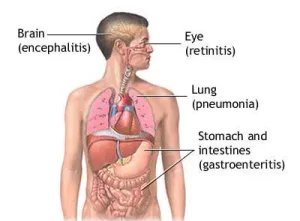Overview
Diagnosis
Lab tests are used to detect a cytomegalovirus (CMV) infection. These may include tests of blood, saliva, urine, or even tissue samples in certain cases.
During Pregnancy and After Delivery
Pregnant individuals are not routinely tested for CMV. However, testing may be recommended if:
-
You’ve been exposed to someone who is ill from CMV.
-
You experience symptoms such as fever, headache, fatigue, sore throat, or swollen glands.
-
An ultrasound suggests that your unborn baby might have a CMV infection.
-
You have a weakened immune system.
If you’re pregnant, testing can also determine whether you’ve previously been infected with CMV. Blood tests look for antibodies — proteins made by the immune system in response to infection. These antibodies can remain in the body for months or years after the initial infection.
If testing detects antibodies that suggest a recent CMV infection, more tests may be done. A new infection during pregnancy increases the risk of CMV transmission to the baby. Pregnant women who already have CMV antibodies face a smaller chance of reactivation, but if the virus becomes active again, it can still infect the unborn child.
When a new infection is found during pregnancy, a prenatal test called amniocentesis may be recommended. This involves taking a sample of amniotic fluid using a needle to determine if the baby has been infected. Amniocentesis is typically advised when ultrasound findings indicate possible CMV-related issues.
If a healthcare provider suspects congenital CMV, the baby should be tested within three weeks of birth. If the test confirms CMV, additional tests may be needed to check the health of vital organs such as the liver and kidneys.
In People with Weakened Immune Systems
Regular CMV testing is especially important for individuals with weakened immune systems, such as those with HIV or AIDS, or people who have had an organ or bone marrow transplant. Ongoing monitoring helps prevent complications and allows early treatment if infection occurs.
More Information:
Amniocentesis
Treatment
Treatment for cytomegalovirus (CMV) infection depends on the person’s health status and the severity of symptoms. Most healthy adults and children recover without medication. Those who develop CMV mononucleosis typically get well on their own.
Medications
Newborns and individuals with weakened immune systems usually need treatment if they develop CMV symptoms. The treatment approach depends on which organs are affected and how severe the infection is.
-
Antiviral medicines are commonly prescribed. These drugs help slow the virus’s replication, though they don’t eliminate it completely.
-
Ongoing research is being done to develop new antiviral medications and experimental vaccines to manage and prevent CMV infection.
Therapies
Children who experience hearing loss due to CMV can benefit from specialized therapies and devices:
-
Speech therapy helps improve communication, language, and listening skills.
-
Occupational therapy assists children in performing everyday tasks affected by hearing difficulties.
-
Hearing aids and assistive devices can enhance hearing ability and improve quality of life.
Early treatment is crucial — the sooner a child receives help for hearing loss, the better they can adapt and develop effective communication skills.
Advertisement

